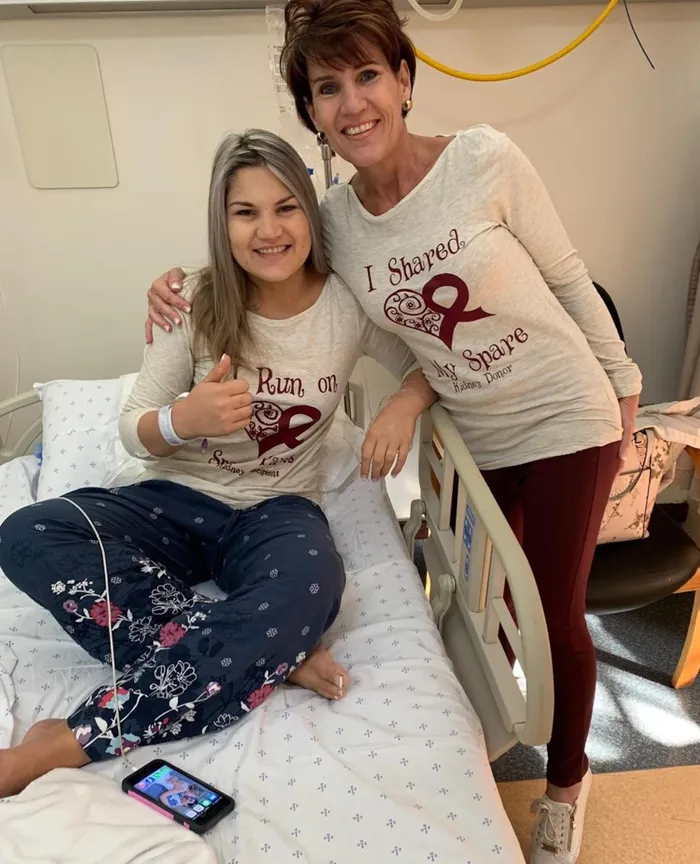How a mother's love saved her daughter's life

Jeane Petzer and her mom Laetitia Janse van Vuuren
Image: Supplied
When Jeané Petzer was diagnosed with type 1 diabetes at just seven years old, her childhood instantly shifted.
Instead of carefree days, her life became a cycle of insulin injections, constant blood glucose checks, and frequent trips to the doctor’s rooms and pharmacy counter. What she didn’t expect was how deeply the medications, medical devices, and the people supporting her would shape not just her health, but her entire journey through life.
Now 32 years old, she is not only a kidney transplant recipient, but also a mother, a former teacher and a beacon of hope for others facing chronic illness.
Petzer’s early years were marked by the daily challenges of type 1 diabetes. Despite the constant finger pricks and insulin injections, she pursued her dream and graduated as a Foundation Phase teacher, working with children aged three to five years old. But in 2018, everything changed.
“I was suddenly too weak to keep up with the little ones. Even simple tasks like making my bed or climbing stairs felt impossible. I knew something serious was happening,” she recalled. Unbeknown to her, these were the first signs of kidney failure – a common complication of diabetes.
In 2019, just a year after her wedding, Jeané underwent a life-saving kidney transplant. Her donor was her mother, who stood by her side every step of the way.
“My mom didn’t hesitate for a second. We went through this together as a family. My husband, parents and sister were my biggest supporters and were alongside me for the entire journey. We fought the fight together,” Petzer said.
The transplant was a success, but managing her health did not stop there. Petzer continued to rely on medical devices like her insulin pump and continuous glucose monitor to manage her diabetes while adjusting to new transplant medications.
The gift of life came with a new lifelong commitment, immunosuppressive therapy. This leaves her vulnerable to viruses and infections, making a return to the classroom impossible.
“I miss teaching every day, but my health has to come first.” She now works flexible hours in her father’s office and from home, an arrangement which allows her to balance productivity with self-care.
Petzer and her husband faced yet another challenge when her nephrologist deemed pregnancy too high-risk due to her diabetes and transplant.
But fate had other plans. A high school friend stepped forward as a surrogate, and in February 2022, the couple welcomed their miracle son, a healthy baby boy.
“He turned three this year, and he’s our joy, our answered prayer,” Petzer said.
Behind Petzer’s story is a dedicated healthcare team, including pharmacists who play a critical role in her care.
“Post-transplant patients like Jeané require precise medication management to avoid organ rejection,” explained Eva Mpe, a specialised medication pharmacist at Medipost, South Africa’s first courier pharmacy.
From managing complex medication regimens to educating patients about drug interactions and monitoring for side effects, the role of pharmacists is highly specialised.
“We ensure patients understand their immunosuppressive medications, how to take them and why timing is vital. A missed dose could mean organ rejection," Mpe said.
“Post-transplant patients, because they must take immunosuppressive medications to prevent their bodies from rejecting the new kidney, are at risk of developing new-onset diabetes after transplantation (NODAT). Managing this requires a multidisciplinary approach involving pharmacists, endocrinologists, nephrologists, and dietitians to ensure early detection, prevention and treatment.
“As a pharmacist, I can coordinate with nephrologists and the transplant surgeons to adjust medication regimens safely by making medication recommendations based on the patient’s current drug profile, co-morbid conditions, verifying dosages and making any recommendations or reporting any side-effects experienced by the patient. Timing is everything. Missing even one dose of anti-rejection meds can cause major complications,” added Mpe.
Cape Times